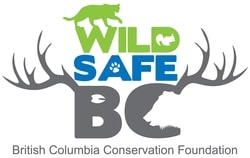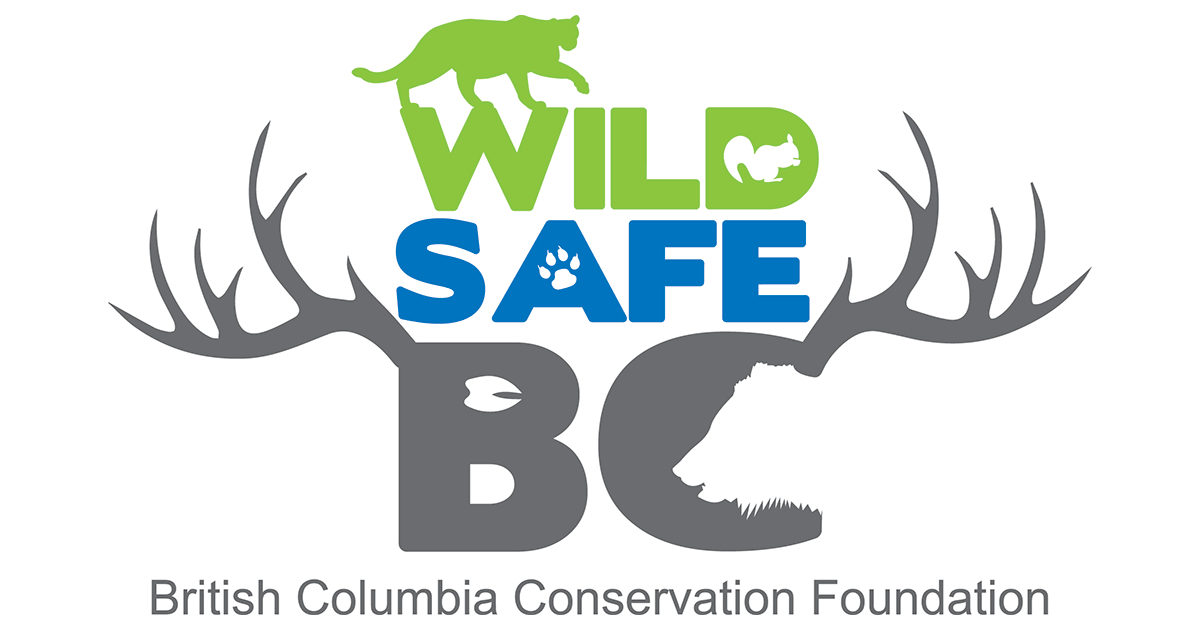WildSafe Camping
BC is wildlife country and you should expect to encounter wildlife when you recreate in their habitat and even on your journey to your favourite recreation spot. This may be as close to you as nearby trails, parks and campgrounds. Before heading out to go camping, you should have a plan on how you will prevent conflicts with wildlife and keep them wild and your camping party safe.
Become Informed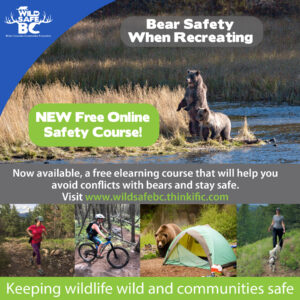
Be prepared by finding out what wildlife you can expect to encounter. BC Parks and Parks Canada will often have information on their websites and post any wildlife advisories. You can also find out more by stopping by local Visitor Centres.
Learn more about local wildlife by visiting our species pages. Do you know what to do if you encounter a bear, wolf or cougar?
Always assume you may encounter wildlife in BC and practice Bare Campsite strategies to avoid inviting a bear or other animal to your campsite. Download our brochure to learn more. Bring bear spray and learn how to transport it and deploy it safely.
Take Our Course!
One of the easiest ways to become more knowledgeable and prepared when you are recreating in BC is take our FREE Recreating in Bear Country Course so that you know how to react appropriately if you encounter a bear and what you can do prevent conflicts. You will also learn the benefits of bear spray and how to transport it and use it safely.
Slow Down for Wildlife
While travelling along roads and highways, also be mindful of your speed and watch for wildlife that may be feeding along the road. On average, 4 people are killed and 870 are injured in wildlife-vehicle collisions in BC every year. Learn more about wildlife collisions at wildlifecollisions.ca.
Avoid Wildlife Jams
Stopping to view and photograph wildlife should be avoided on busy stretches where highway speeds are in excess of 60 km/h, or where sightlines are poor. Always stay in your car and avoid disturbing or stressing wildlife. A startled animal may end up crossing the road and being hit by another vehicle.
Never Feed Wildlife
For the sake of wildlife, your own safety, and that of your family, as well as the safety of other visitors, NEVER feed wildlife. This includes squirrels, birds, raccoons and other animals. Do not toss organics or anything else from your window when travelling. This can draw wildlife to areas where they may get struck by vehicles. Also, do not discard apple cores or banana peels on trails. This can attract wildlife to areas used by people and lead to negative interactions. Practice "Leave no Trace" principles and always pack out what you pack in.
Take the Pledge
WildSafeBC has joined the Camper's Code Alliance to encourage those recreating in BC to do so safely and reduce our collective negative effects on our natural environments and wildlife. One of the ways we can protect our natural spaces and enjoy them for generations to come, is to commit to these 9 simple rules by taking the Camper's Code Pledge at www.camperscode.com.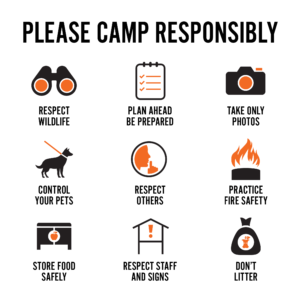
Front Country Camping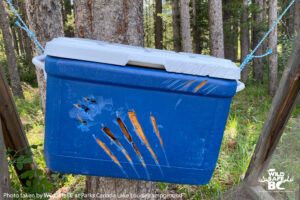
Note, anything with an odour can attract wildlife. Never leave these items unattended or bring them into your sleeping area, This includes:
- Food and items used in food preparation
- Coolers whether empty or full
- Garbage and wrappings
- Pet food and bowls
- Bottles, cans and recyclables
- Deodorant, toothpaste, citronella etc.
Keep a “Bare” campsite to keep you and your camping neighbours safe.
- Keep all attractants in your hard-sided vehicle or use
- storage lockers if provided –
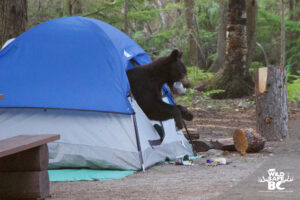 NEVER in YOUR TENT
NEVER in YOUR TENT - Dispose of grey water (water used for dishwashing) in designated areas or at least 50 m from sleeping area
- Dispose of garbage and recyclables promptly at designated site
Back Country Camping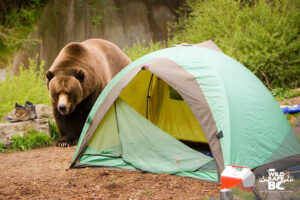
If there is a designated campsite, use it and any bear-resistant storage options that are available. If you are in an undeveloped area, keep your cooking and dishwashing activities as well as food storage at least 50 m away and preferably downwind.
Where possible, food should be slung up by a rope system in an area inaccessible to bears (at least 4 m off the ground and 3 m from the nearest tree). Alternatively, bring a certified bear-resistant canister. The Interagency Grizzly Bear Committee tests products with live bears and they list certified products here. Never bring any attractants into your tent and avoid sleeping in the clothes you cooked in. DO bring your bear spray into your tent at night, with the safety clip on and in a holster, and keep it handy.
Inspect your choice of camping area closely and make sure it is not in an area likely to be used by bears. Avoid areas that have attractive sources of food such as berry bushes or active spawning salmon streams. It is best to camp away from waterways or other features that may be travel routes for wildlife. Check for signs of bears (scat, claw marks on trees, fresh digging and/or tracks).
Always pack out what you pack in. Do not put others at risk by teaching wildlife to associate people, and our activities, with sources of food.
